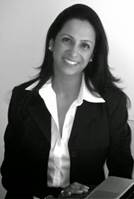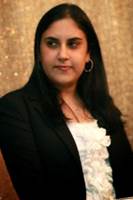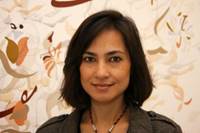Making their Mark: Success Stories of Pakistani-American Women
By Riaz Haq
CA
Shama Zehra, Shaan Kandawalla, Shahzia Sikandar and Fatima Ali are among the many Pakistani-American women making their mark in America.
Shama Zehra is in finance, Shaan Kandawalla in technology, Shazia Sikandar in the Arts and Fatima Ali in fine cuisine.

|
Shama Zehra |
Shama Zehra is the CEO of Wall Street firm Aligned Independent Advisors . She began her career as an entrepreneur in the apparel industry in Pakistan in 1991 with a women apparel firm co-founded with her mother and sister. Later, she moved into financial services industry in 1995 where she has worked in Investment Banking, Consumer Credit Products and Private Wealth Management. Prior to forming Aligned, Shama worked with Goldman Sachs, Morgan Stanley, Standard Chartered Bank and MCB Bank, the largest private sector bank in Pakistan in early nineties.

|
Shaan Kandawalla |
Shaan is the CEO of PlayDate Digital which makes educational applications for kids. She launched it in 2012 after many years of experience working at Nickelodeon and Hasbro. Apps produced by PlayDate feature Hasbro brands like Play-Doh, My Little Pony and Transformers. She is a rare female in a male-dominated world. A study by the mobile-tech company Appcelerator reported that 96 percent of all mobile-app developers are male, most between the ages of 20 and 29. Yet market research indicates that women are the app stores’ biggest customers. Women install 40 percent more apps than men, have 17 percent more paid apps and pay 87 percent more for those paid apps, according to data from Apsalar, a mobile-analytics company.

|
Shahzia Sikandar |
Shazia Sikandar is best known for her Indo-Persian miniatures. Trained as a miniaturist at the National College of Arts in Lahore, Pakistan, Sikander pursues this centuries-old tradition by challenging notions about the division of art and craft. Her work has been displayed at numerous solo and group exhibits at such national and international venues as the Museum of Modern Art, New York, the Hirshhorn Museum and Sculpture Garden, the National Gallery of Canada, the Venice Biennale 2005, and the Musée d'Art moderne de la Ville de Paris.
Fatima Ali , a graduate of the Culinary Institute of America (CIA), may be the only non-American female chef in any of 70 top New York City restaurants, according to a survey done by Voice of America . Her unique blend of Pakistani spices and Western cuisines won her the top award of $10,000 on the popular Food Network TV show "Chopped".

|
Fatima Ali |
Women are also increasingly joining the work force in Pakistan to contribute to national development. "More of them (women) than ever are finding employment, doing everything from pumping gasoline and serving burgers at McDonald’s to running major corporations", says a report in Businessweek magazine .
Beyond company or government employment, there are a number of NGOs focused on encouraging self-employment and entrepreneurship among Pakistani women by offering skills, training and microfinancing . Kashf Foundation led by a woman CEO and BRAC are among such NGOs. They all report that the success and repayment rate among female borrowers is significantly higher than among male borrowers.
In rural Sindh, the PPP-led government is empowering women by granting over 212,864 acres of government-owned agriculture land to landless peasants . Over half of the farm land being given is prime nehri (land irrigated by canals) farm land, the rest being barani or rain-dependent. About 70 percent of the 5,800 beneficiaries of this gift are women. Other provincial governments, especially the Punjab government, have also announced land allotment for women, for which initial surveys are underway, according to ActionAid Pakistan .
Both the public and private sectors are recruiting women in Pakistan's workplaces ranging from Pakistani military, civil service, schools, hospitals, media, advertising, retail, fashion industry, publicly traded companies, banks, technology companies, multinational corporations and NGOs, etc.
Here are some statistics and data that confirm the growth and promotion of women in Pakistan's labor pool:
1. A number of women have moved up into executive positions, among them Unilever Foods CEO Fariyha Subhani, Engro Fertilizer CFO Naz Khan, IGI Funds CEO Maheen Rahman and Kashf Foundation's Founder and CEO Roshaneh Zafar.
2. Women now make up 4.6% of board members of Pakistani companies, a tad lower than the 4.7% average in emerging Asia, but higher than 1% in South Korea, 4.1% in India and Indonesia, and 4.2% in Malaysia, according to a February 2011 report on women in the boardrooms .
3. Female employment at KFC in Pakistan has risen 125 percent in the past five years, according to a report in the NY Times .
4. The number of women working at McDonald’s restaurants and the supermarket behemoth Makro has quadrupled since 2006.
5. There are now women taxi drivers in Pakistan. Best known among them is Zahida Kazmi described by the BBC as "clearly a respected presence on the streets of Islamabad".
6. Several women fly helicopters and fighter jets in the military and commercial airliners in the state-owned and private airlines in Pakistan.
Here are a few excerpts from the recent Businessweek story written by Naween Mangi:
About 22 percent of Pakistani females over the age of 10 now work, up from 14 percent a decade ago, government statistics show. Women now hold 78 of the 342 seats in the National Assembly, and in July, Hina Rabbani Khar, 34, became Pakistan’s first female Foreign Minister. “The cultural norms regarding women in the workplace have changed,” says Maheen Rahman, 34, chief executive officer at IGI Funds, which manages some $400 million in assets. Rahman says she plans to keep recruiting more women for her company.
Much of the progress has come because women stay in school longer. More than 42 percent of Pakistan’s 2.6 million high school students last year were girls, up from 30 percent 18 years ago. Women made up about 22 percent of the 68,000 students in Pakistani universities in 1993; today, 47 percent of Pakistan’s 1.1 million university students are women, according to the Higher Education Commission. Half of all MBA graduates hired by Habib Bank, Pakistan’s largest lender, are now women. “Parents are realizing how much better a lifestyle a family can have if girls work,” says Sima Kamil, 54, who oversees 1,400 branches as head of retail banking at Habib. “Every branch I visit has one or two girls from conservative backgrounds,” she says.
Some companies believe hiring women gives them a competitive advantage. Habib Bank says adding female tellers has helped improve customer service at the formerly state-owned lender because the men on staff don’t want to appear rude in front of women. And makers of household products say female staffers help them better understand the needs of their customers. “The buyers for almost all our product ranges are women,” says Fariyha Subhani, 46, CEO of Unilever Pakistan Foods, where 106 of the 872 employees are women. “Having women selling those products makes sense because they themselves are the consumers,” she says.
To attract more women, Unilever last year offered some employees the option to work from home, and the company has run an on-site day-care center since 2003. Engro, which has 100 women in management positions, last year introduced flexible working hours, a day-care center, and a support group where female employees can discuss challenges they encounter. “Today there is more of a focus at companies on diversity,” says Engro Fertilizer CFO Khan, 42. The next step, she says, is ensuring that “more women can reach senior management levels.”
The gender gap in South Asia remains wide, and women in Pakistan still face significant obstacles. But there is now a critical mass of working women at all levels showing the way to other Pakistani women.
I strongly believe that working women have a very positive and transformational impact on society by having fewer children, and by investing more time, money and energies for better nutrition, education and health care of their children. They spend 97 percent of their income and savings on their families, more than twice as much as men who spend only 40 percent on their families, according to Zainab Salbi, Founder, Women for Women International, who appeared on CNN's GPS with Fareed Zakaria .
Here's an interesting video titled "Redefining Identity" about Pakistan's young technologists, including women, posted by Lahore-based 5 Rivers Technologies :
http://youtu.be/xhynv21jSkI

